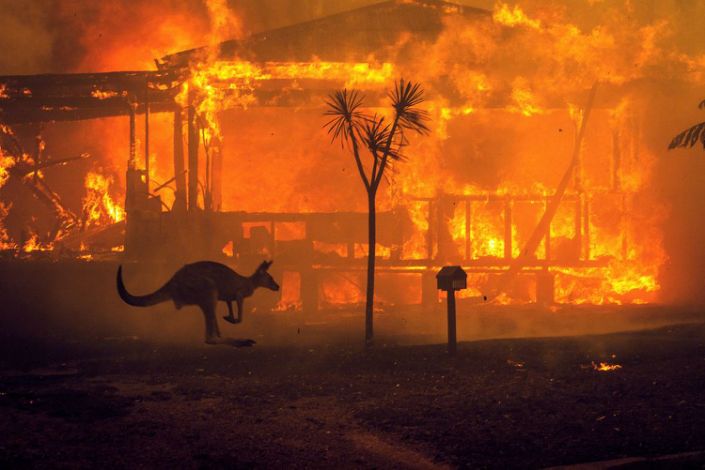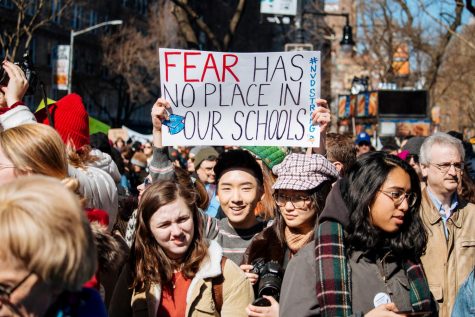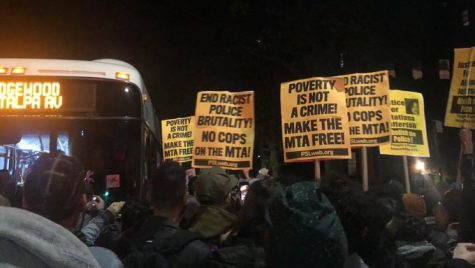Australia is Burning and Climate Change is the Culprit
MATTHEW ABBOTT/The New York Time
A kangaroo rushes past a burning house in Lake Conjola, Australia, on Tuesday, Dec. 31 2019. This fire season has been one of the worst in Australia's history, with at least 15 people killed, hundreds of homes destroyed and millions of acres burned. (Matthew Abbott/The New York Times)
January 22, 2020
Bushfires are common in Australia, but never to the degree, we’ve seen in these past weeks. So far, these fires have killed more than 1 billion animals and at least 29 people. They are affecting all regions of Australia but primarily the New South Wales region. The fires destroyed habitats for thousands of species and put some endemic species into extinction.
These devastating outcomes, while covered by many global news sources, have not prompted the government to address the human-caused climate crisis. It is unclear what will finally make these leaders listen and react to the climate change crisis. Their land is burning, yet the government is not doing enough to protect it. Some commentators are claiming that the January wildfires are just part of Australia’s typical, natural ecological pattern, but this is not the case. While it is true that Australia does usually face destruction during their dry, summer months, it is not to the degree we are seeing this year. There are several reasons for this, many of which can be linked to the climate crisis.
First, fires that Australia has faced in the past have not been nearly as intense as this year’s fires. About 10 million hectares have burned, a plot of land approximately as large as England. Second, the fires have spread much more quickly and have been sustained longer because of the drought that eastern Australia endured from Jan. to Aug. 2019. Some areas faced the least amount of rainfall they have ever experienced. Temperature and wind speeds increased during this time. Low moisture in the soil made it an ideal site for fire to spread and sustain.
Climate change has many outcomes, but in Australia, these manifest mainly through warmer temperatures, decreased rainfall and an increase in heatwaves. All of these effects are the result of increased greenhouse gases and human activity that releases carbon dioxide into the atmosphere. Since these bushfires have links with climate change, and it is the duty of a government to mitigate this issue, the Australian government must react more forcefully than it has.
How has the government reacted to the destruction of its people and ecosystem? During the fires, while people were killed and displaced from their homes, Prime Minister Scott Morrison took himself and his family on a vacation to Hawaii. New South Wales Emergency Services Minister David Elliott also went on a vacation, to Europe, during this time. The Australian people deserve leaders that defend their people and their ecosystem when they need it most, instead of leaders who abandon them in exchange for leisure. Both men have since apologized, but the actions of these two politicians are just a reflection of the government’s consistent, delayed and insufficient action regarding the climate crisis.
Australia’s history of ignoring climate change issues began in 2001 when the cabinet under John Howard chose to withdraw from the Kyoto Protocol, an international treaty that fights to limit greenhouse gas emissions. Since then, they have not made much progress. Just two years ago, Prime Minister Malcolm Turnbull scrapped emission reduction goals set by the Paris Climate Agreement. As a result, their coal industry continues to thrive, releasing more carbon dioxide into the atmosphere. Additionally, the Australian Financial Review claimed that the government has been sitting on a climate change action plan for a year and a half before these destructive bushfires. Perhaps if Australia’s government put more care toward lessening its environmental impact, people and animals may face less devastation.
Of course, Australia is not the only country that faces the climate crisis. Still, they must contribute to global action against climate change to prevent fires like these from intensifying further. Many countries do not act sustainably for economic reasons, but this is illogical since climate change is linked with many natural disasters that weaken economic growth tremendously. In Australia, the economic impact of this year’s bushfires will exceed $4.4 billion, which is a huge blow to Australia’s tourism sector. No longer can we ignore climate change in the name of economics: the crisis has punctured the idea of endless economic growth.
Allocating funds properly to manage the fires is difficult due to the government’s reaction. The government is setting aside funds for wildlife protection fund. However, as an opinion piece in The New York Times suggested, it may be more useful to turn to Aboriginal people for help because they have dealt with bushfires for thousands of years. These bushfires are much fiercer than the past, but incorporating Aboriginal methods of fire-fighting, such as mosaic cool-fire burning, could prevent some of the devastation. This method, paired with a plan to fight climate change, could reduce devastation from both a preventative and a reactionary standpoint.
What will finally get world leaders to care about the climate crisis? It is unclear to me. Perhaps people need to continue speaking out creatively to display the tragedies of these fires. For now, people have been photographing kangaroos and koalas suffering from the fires. Writers are crying out for change using poems and educational articles. Activists are using their voices, participating in events like the Jan. 10 march that protested the lack of response to these fires. Yet, political leaders still don’t want to listen. Hopefully, they’ll begin to pay attention before it’s too late.











If you want a picture to show with your comment, go get a gravatar.